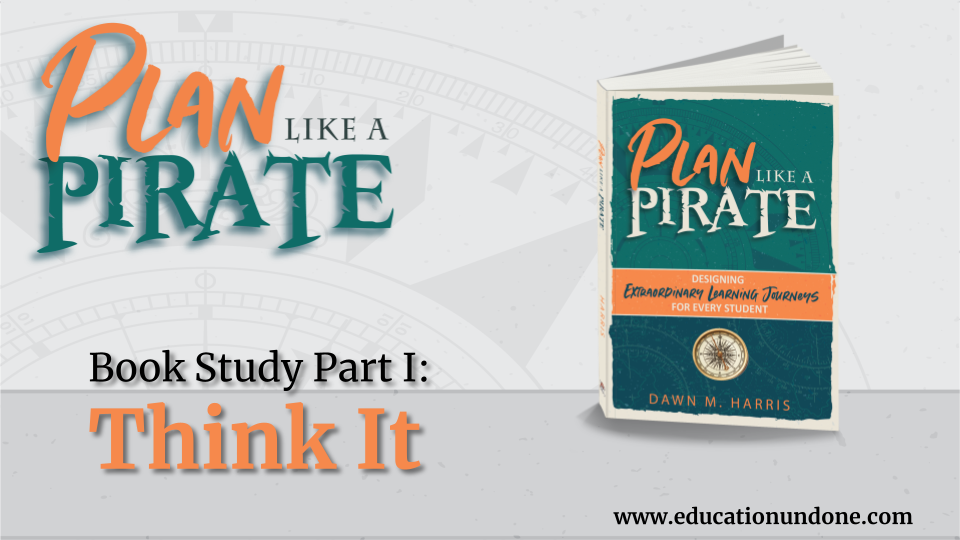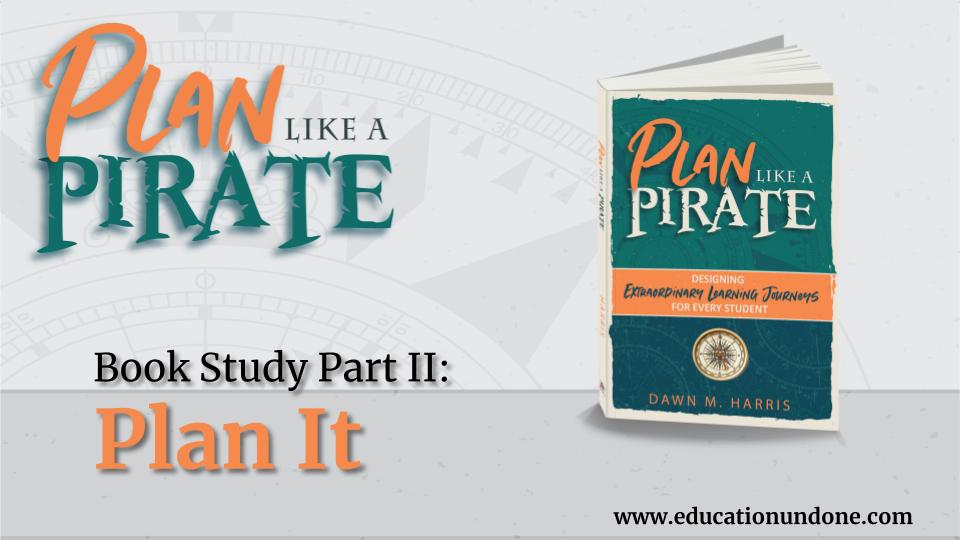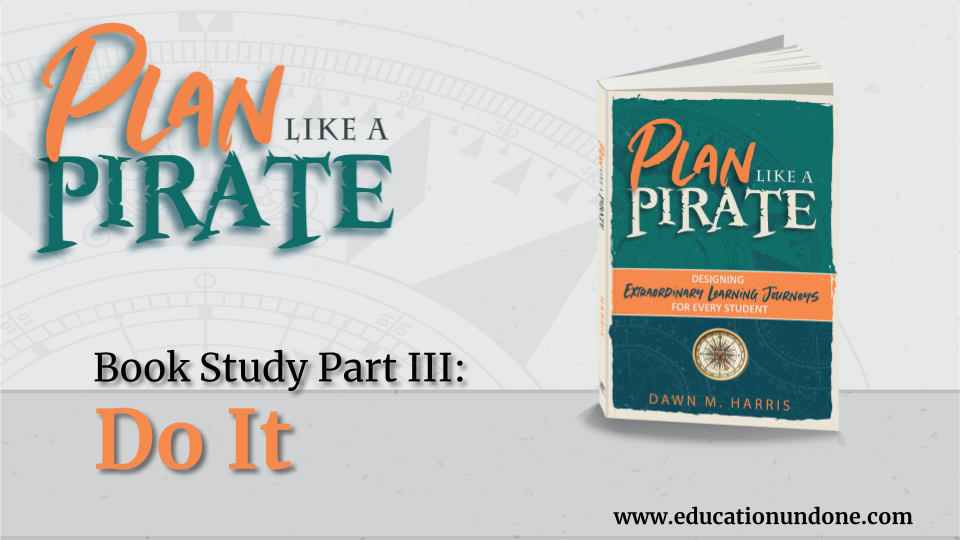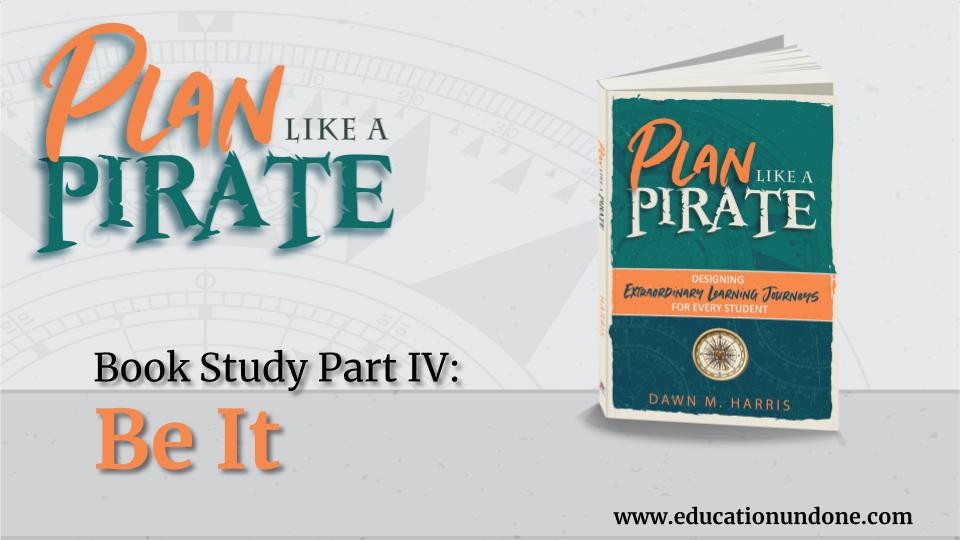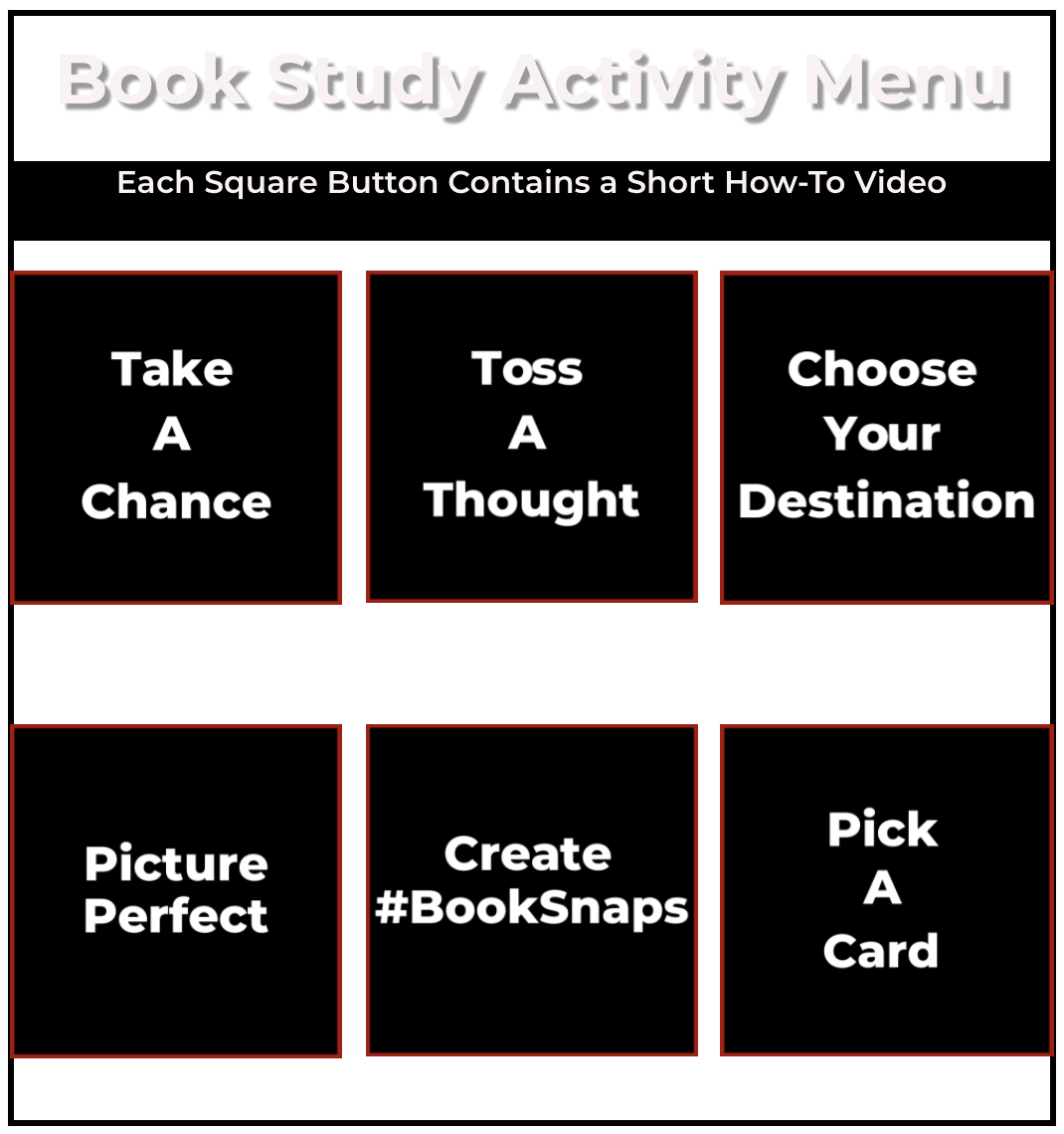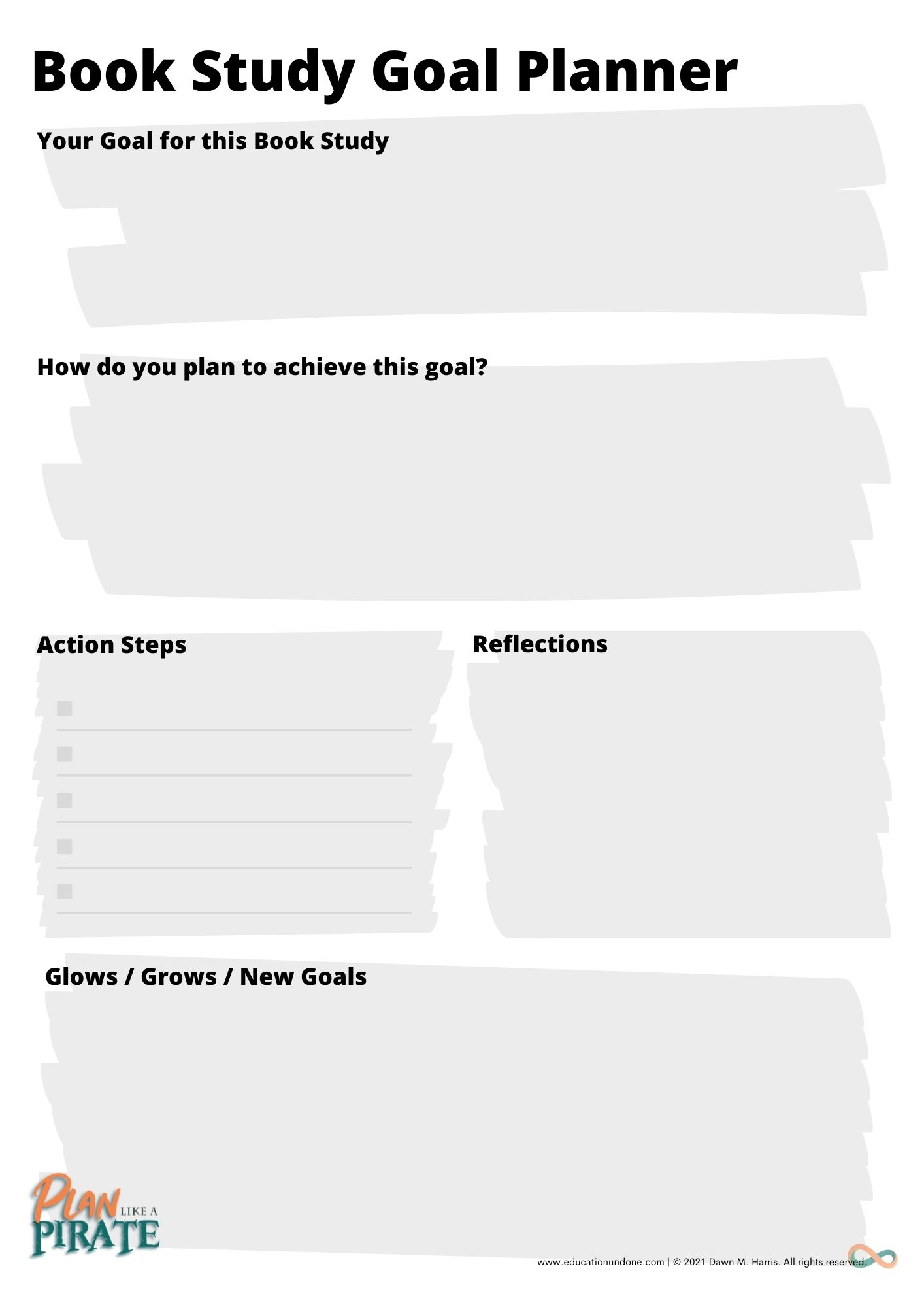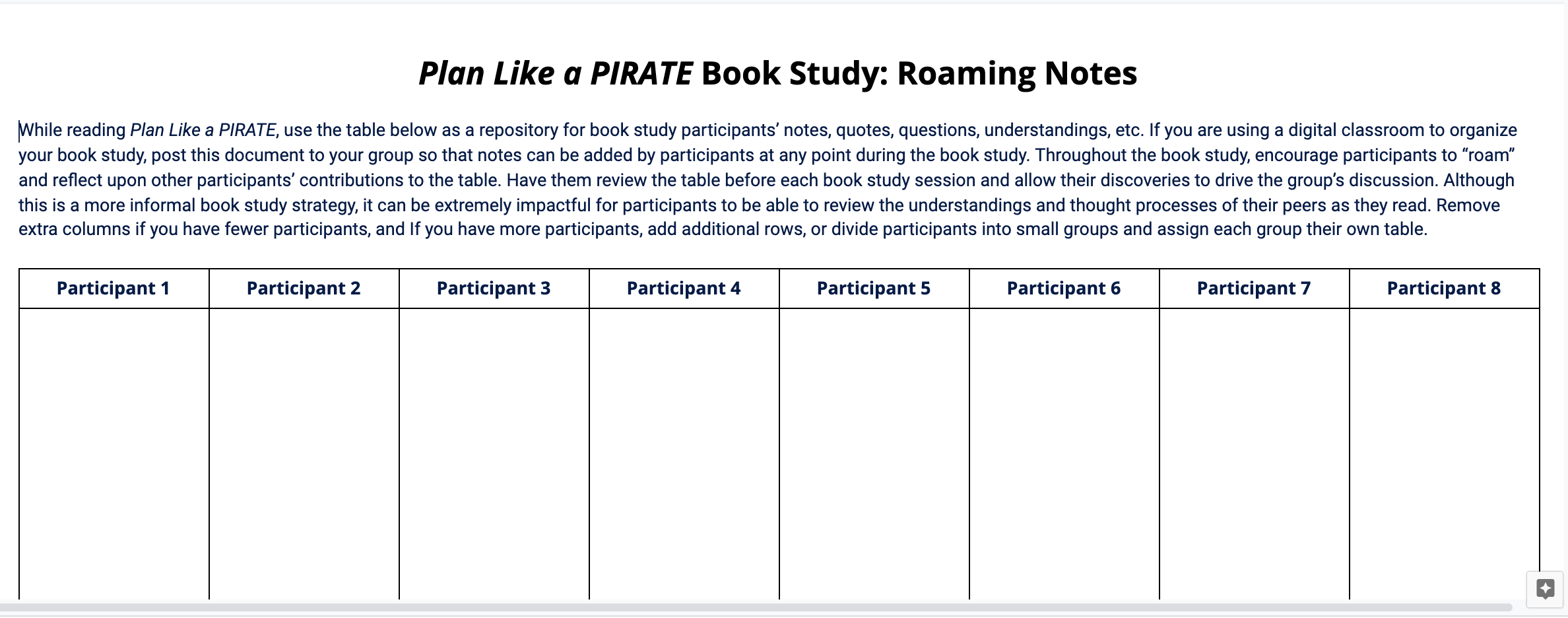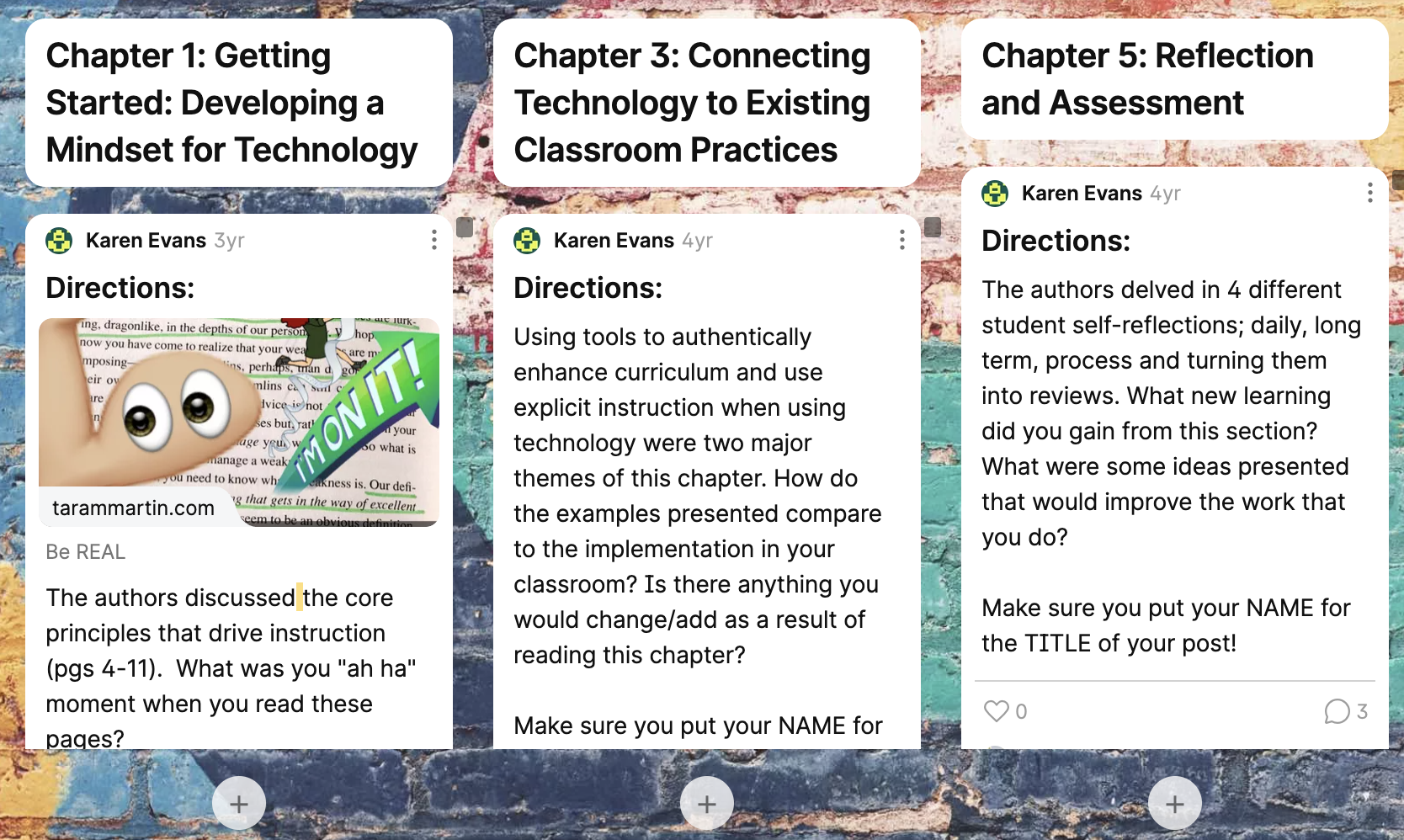Welcome to the Plan Like a PIRATE Book Study Page!
Plan Like a PIRATE is the perfect book for any group to explore. Discussion questions have already been prepared for you to dive into at the end of every chapter in the book. The Education Undone website is also filled with helpful resources, self-development and planning tools, and downloadable templates that will support your group’s growth and development throughout your book study and as you begin implementing PIRATE planning practices in your classroom. The Education Undone Educator Network Facebook group is the perfect place to share your thoughts, ideas, reflections, and questions about the book; and while you are there, you’ll be connecting and sharing lesson plans, resources, and teaching strategies with other like-minded educators.
In addition to the resources you’ll find on this website, I’d love to assist your book study by sending you FREE Plan Like a PIRATE bookmarks and stickers, and I’ll even join your group for a “Meet the Author” session! Contact me so we can discuss how I can support you!
Jump Right In!
If you are set to begin your book study, below you’ll find four sets of reflection questions for Plan Like a PIRATE to get you started. There are two different formats in each file: slides and playing cards. These sets are broken down by each section of the book and are designed to be completed sequentially and can be utilized in a variety of ways (read on to find out how to use them with your group, or jump right to the “Strategies for Engagement” section below!) Please feel free to tailor these reflection questions to fit the needs of your book study. Click on the links below to access each book study section.
If you're ready to order books for your entire group, please reach out to Wendy at Dave Burgess Consulting to get information on bulk orders.
Looking for ways to spice up your book study? Hop over to Dave Burgess Consulting, Inc.'s Book Study page and check out their "how-to" video library jam-packed with fun activities to engage participants and heighten learning!
Not Quite Ready to Begin?
Planning Your Book Study
If you are still in the planning phases of your book study, there are some things you will need to consider before you begin. First and foremost, you want to make sure that you have designed a process for archiving the learning that occurs within your group as you facilitate your book study. I find that it’s always nice to be able to easily locate and reference the professional learning I have participated in so that when I need it, I know exactly where to look! As you continue planning, think about what might be the best ways for your book study PLC to access the collective learning, materials, and resources that have been shared.
Roles
In more formal book studies, you may choose to designate roles to facilitate learning within the group. Perhaps, you want to set up structured meetings with group members alternating roles such as facilitator, questioner, notetaker, and timekeeper. If you are the coordinator or book study leader, it will be important to establish yourself as a partner in learning as well; however, before you begin, I would also suggest that you complete a reading of the book so you are aware of what participants will experience and learn throughout the process.
You do not have to designate roles within your book study for it to be successful, but it is important to enter into each session with a plan for engaging participants in discussion surrounding each assigned reading. Informal book studies can be just as effective with a single facilitator whose role it is to guide discussion so that readers are able to lead their own learning. As the organizer, you may want to discuss the book study format with participants to see what best meets their needs and interests. You will also want to inquire about the best ways in which they learn and how they like to access information. This information will be helpful regardless of the type of book study.
The “Long and Short” of Scheduling
Another consideration will be how long you want your book study to last. Perhaps you plan to engage in a long-term, deep dive into Plan Like a PIRATE that requires educators to dig into their curriculum and their teaching practice using the book as the lens through which they evaluate these things. In this case, perhaps a month-long reading of the book will help readers grasp the concepts and ideas the book contains and will help set the stage for the application phase during the remainder of the school year. Your group might exit the reading with a plan for implementing strategies and practices from the book in the classroom, then reconvening on a monthly basis to discuss successes and challenges they experienced during implementation in the context of the book’s content.
Your book study can also be a quick one--as little as a half-day PD! Try using the Jigsaw method by dividing the book up into sections and assigning them to individual members or small groups who will read and analyze their section in a set amount of time. Create a working document to record group members' responses as they read.
Try this schedule for conducting your half-day Plan Like a PIRATE in-house PD:
- 0:00 - 0:30: Establish the purpose of the group; disseminate materials; assign book sections
- 0:30 - 1:30: Individual reading and note-taking; form questions for the group
- 1:30 - 2:30: Conduct a Socratic-style Seminar for sharing individual/small group learnings and reflections from each section
- 2:30 - 3:30: “Essential 8” Micro-Workshop - allow teachers to spend time designing learning segments utilizing the Essential 8 Framework
- 3:30 - 4:00: Wrap Up - share Glows, Grows, and Goals moving forward
Make sure educators have an accessible digital location to store their work from this session so it can be easily retrieved for reference later when needed.
Setting is Everything
As an English teacher, one of my favorite parts of reading literature is exploring the setting of the fantastic stories I read. Setting is important to your book study, too! You want to create a convenient, yet comfortable and inviting space that participants look forward to learning in every time you meet.
Not only will you need to consider when, where, and for how long you’ll meet, but you’ll also want to think about the environment you wish to create for your group. You may be meeting in-person, which means the social setting you choose can have a positive or negative effect on participation. You want to make sure the space you choose allows for your participants to interact effectively by giving them the physical space needed to see and hear one another clearly. You don’t want to lose members (literally or figuratively) due to distractions in the learning environment.
If you are meeting virtually, offering an engaging learning environment is going to be key to book group’s success. Learning from home is an entirely different dynamic than learning in-person--if we didn’t know this before, we all know this now after transitioning to pandemic teaching in 2020! To keep engagement levels high, make sure you establish norms for interacting virtually. Invite group members to participate in setting expectations and guidelines for how they will interact with one another within your virtual book group. The goal is for everyone to grow from this experience and exploring what participants need is the right place to start!
You might also conduct your book study fully online through a digital classroom platform or in an online learning management system. These kinds of independent studies can be highly effective, but they need parameters, too. You’ll need to think about how long the book study will last. Will folks be able to enter and exit the study as they complete the book and any related activities? How will you invite participants to engage in online discussions, or will there be requirements for this? Just like in our classrooms, managing learning online requires advanced decision-making so that group members are sure to meet their goals for learning.
Goal Setting Matters
You’ve heard me mention goals several times now, right?! Book groups and their participants must have goals! As the leader or organizer of the book group, you may have previously established goals for the group, but you will also want to build in time in your initial session for individual group members to identify and establish their own goals for learning. This process will be beneficial for all involved as it provides readers with a clear direction and purpose during reading. By the end of the book study, all participants should feel like they have accomplished at least one goal through their participation in the book study. Encourage each member to track their progress towards goals in a personal journal or using handouts like this one. Click on the image to download a copy!
Relationship Building is Essential
One of the most important parts of your book study will be the relationships that evolve out of participation in this book study. This PLC will become a “learning family” of sorts who, with their newfound knowledge and expertise, can rely on one another for ongoing encouragement and support. Be sure to plan a celebration at the end of your book study that gives members time to connect on a more personal level and plan time for additional connections after your group concludes so they can continue to share their successes and challenges with implementation of the practices and strategies in Plan Like a PIRATE. Beyond fostering growth and the enhancement of practice, your book study should also serve to broaden connections between educators across your learning community, thus making PIRATE planning a component that fuels a cohesive culture within your learning organization.
Share Your Experiences with Others
Don’t keep all the great things your book study is experiencing to yourselves! Share your progress, growth, discoveries, and creations on social media. Post to Twitter or Instagram using the #PlanLAP and #Booksnaps hashtags. Let others know about the exciting things you are learning. Have participants share photos, lessons, questions, ideas and reflections to personal Facebook pages and in the Education Undone Educator Network or to other groups you belong to--let others know how Plan Like a PIRATE is transforming classrooms so that learning has become an extraordinary journey for every student in your school!
Strategies for Engagement
If you need some help with ways to ignite learning in your book study, here are a few methods, tools, and strategies you might try.
Roaming Notes
While reading Plan Like a PIRATE, use a table like the one below as a repository for book study participants’ notes, quotes, questions, understandings, etc. If you are using a digital classroom to organize your book study, post the document to your group’s page so that notes can be added by participant at any point during the book study. Throughout the book study, encourage participants to “roam” and reflect upon other participants’ contributions to the table. Have them review the table before each book study session and allow their discoveries to drive the group’s discussion. Although this is a more informal book study strategy, it can be extremely impactful for participants to be able to review the understandings and thought processes of their peers as they read. If you have more participants, add additional rows, or divide participants into small groups and assign each group their own table.
Click the image below to access an editable template to use for your book group.
Read more about roaming notes and other book study strategies from The Leader in Me.
Padlet Interactive Book Study
Padlet is a great way to organize participants’ contributions to the book study. Begin by creating your Padlet and inviting book study members to join using the “share” button. Decide ahead of time how you will engage readers in participation: will you break discussion down by chapter or by posing questions that each member can respond to accordingly. Another option is to treat your Padlet as another version of Roaming Notes where each participant creates a section of their own and they add contributions beneath their own named heading. Regardless of how you decide to organize your Padlet, encourage interactions between participants that involves commenting and responding to other participants in the different sections of the Padlet. I especially like Padlet as a book study facilitation tool because upon completion of the book study, the group is left with a fabulous archive of the wonderful learning journey that took place!
Check out this example of a Padlet.com book study for Amplify: Digital Teaching and Learning in the K-6 Classroom that has been broken into chapters.
For more help with how to create your book study in Padlet.com, watch Cammie Kannekens break it all down for you so you can do it, too!
Voxer Book Study
Voxer is a fantastic platform for hosting your book study. This unique messaging app offers participants a number of ways to interact with each other during the book study. The Voxer messaging app lets members use live voice, text, photos and text-style messaging to communicate with one another. Because participants can leave messages anytime they are ready, group members can catch up and interact when it is convenient for them. Hosting a voxer book study is as easy as one-two-three:
- Download the Voxer app and invite participants
- Establish the reading schedule & share details with the group.
- Throughout each week, members share thoughts, questions, and insights gained from the reading and participants engage and connect with one another by responding to comments and shares.
Voxer is a fun, no stress, minimal prep way to study books. It can be an authentic and organic experience that allows group members to grow through the connections they make while participating.
Twitter Chat
If your group is full of Tweeps (Twitter People), you might try turning your book study into a Twitter chat! First, you’ll want to create a unique hashtag that everyone will use when communicating on Twitter. Then decide on the time and whether or not you will meet and tweet simultaneously, or if your twitter chat will be completely remote. To learn more about how you can make Twitter work for your book study, check out this terrific article by Jennifer Hogan, aka The Compelled Educator.
Wakelet Timeline and Resource Curation
If you are at all familiar with Wakelet.com, then you know it is a fantastic curation tool and makes for an awesome information storehouse! You might consider using Wakelet as a supplemental tool to store the resources your team gathers or creates during their book study. You might also drop into your collection the materials participants will utilize throughout the book study which can be arranged either by chapter or by meeting date. Check out this Wakelet book study for The Chromebook Infused Classroom by Holly Clark for some inspiration and ideas.
Book Study Reflections
As the book study facilitator, one of your goals will be to get participants to reflect on what they have read in order to think about how they might apply what they have learned in their own classroom. Share these documents with participants throughout the book study so they can reflect on concepts and ideas from the book. Invite participants to share their reflections with others during discussions in order to help broaden perspectives and understandings and so participants can learn from one another in addition to all they learn from reading. Click here to download copies of these reflection handouts that you can use with your group.

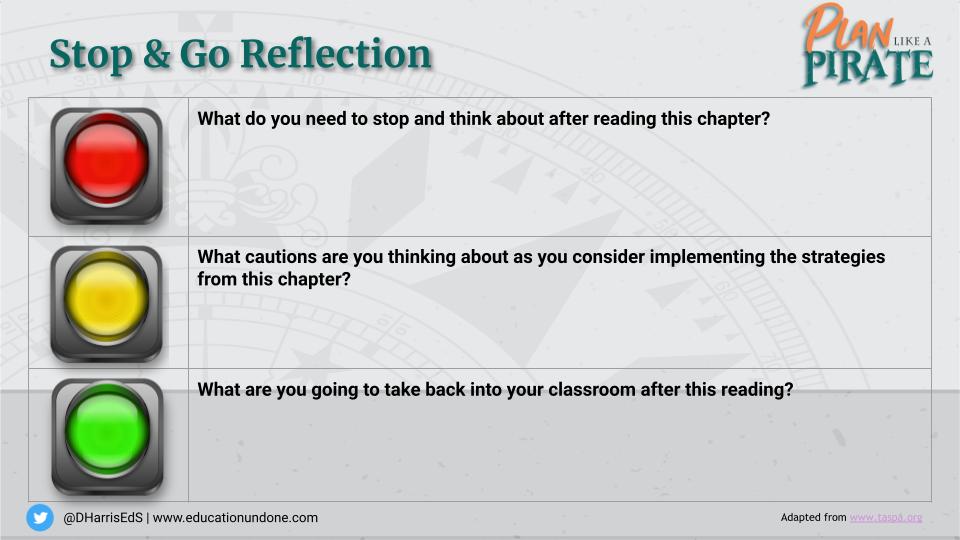
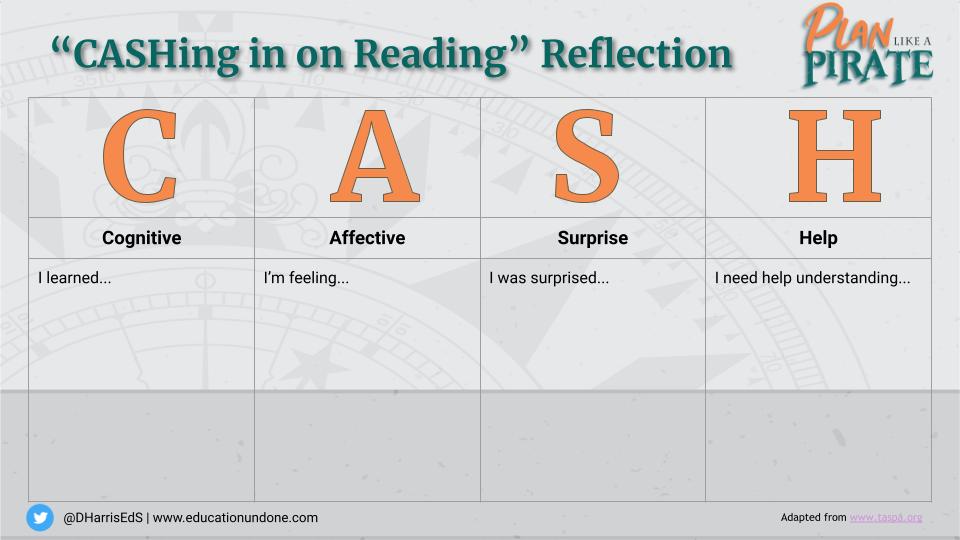
I hope you found the information on this page helpful in getting your book study started. If I can support you in anyway, please feel free to reach out to me by filling out this contact form!

